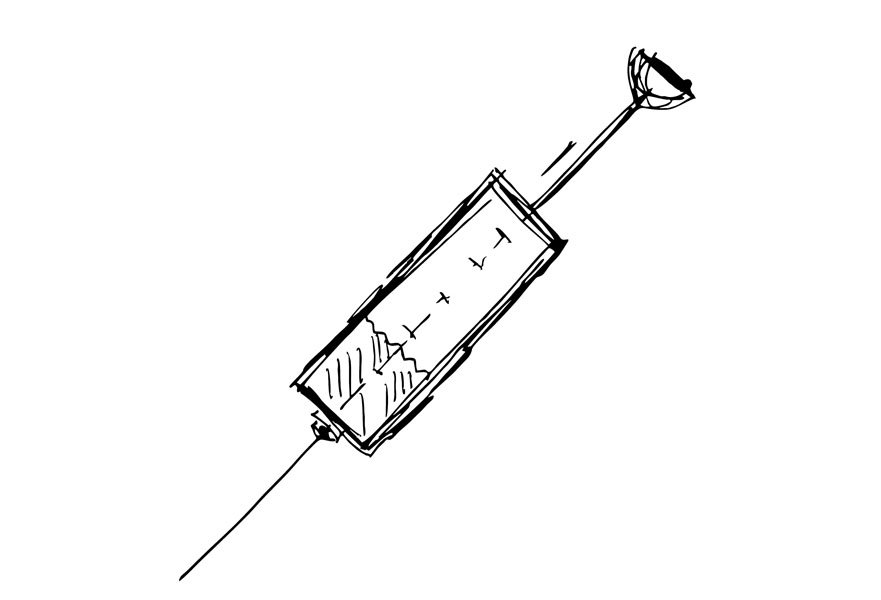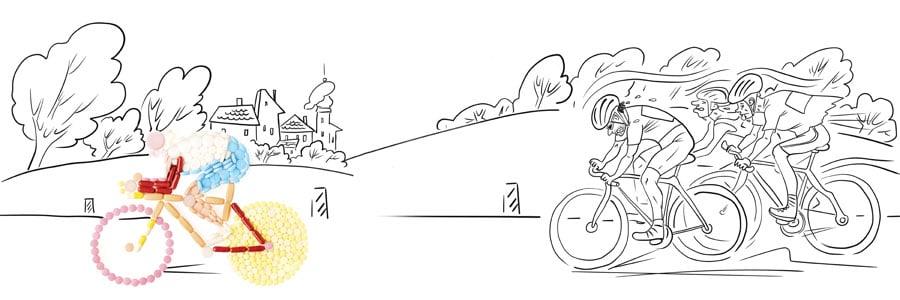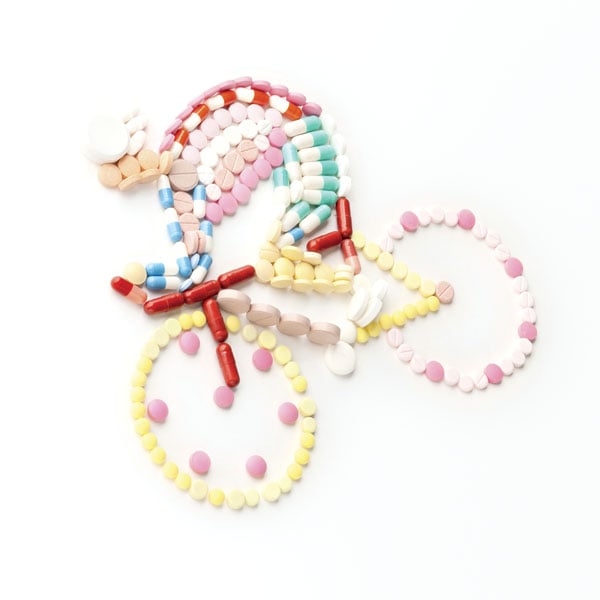I hit rock bottom as a sports fan in July 2007.
I was sitting in my living room watching the Tour de France, rooting for a Kazakh rider named Alexander Vinokourov. I don’t know what drew me to “Vino,” or, for that matter, what makes any of us root for certain athletes. I guess I admired his tenacity.
Five days into the three-week race, Vinokourov—a favorite to win the overall title—had crashed in a ditch and watched the field ride away from him, all but ending his hopes of donning the maillot jaune in Paris. But Vino didn’t give up. He fought back and dominated an individual time trial in Stage 13, then won again in the mountains two days later. I remember pumping my fist and shouting at the television when he crossed the line that day, bandaged and defiant.
Maybe I was tired of rooting for Americans in the Tour. The prime culprit, of course, was Lance Armstrong. But in 2006, my heart broke as I watched the people’s favorite, Floyd Landis, bonk in a crucial stage 16 and lose 10 minutes to the field. Then, the very next day, I went hoarse shouting for Landis as he roared back to stun everyone and win by 5:42. I still remember bolting out my front door after that stage and riding my mountain bike as fast as I could for three hours, so inspired by what Landis had done.
Four days later, Landis won the Tour de France … only to have it all soiled by a positive synthetic-testosterone test that made him the first Tour champ in 102 years to be stripped of his title.
When Vino charged to his second stage win the following summer, I thought there was no way he was dirty. The sport he loved was in too fragile a place for him to cheat. I should have known better. We all should have.
Four days after his thrilling time-trial win, the news broke: Vino had tested positive for blood doping. He and his team, Astana, were thrown out of the race. This meant Danish rider Michael Rasmussen was the Tour’s new leader. Rasmussen was promptly disqualified for lying about his whereabouts during pre-Tour drug testing (he later admitted to doping from 1998 to 2010). Organizers scrambled. Cynics bellowed.
Cycling was disgraced, and I was exasperated.
Less than two weeks later, Barry Bonds broke Henry Aaron’s all-time home run record, belting his 756th dinger on August 7. Bonds, of course, would prove to be one of the dirtiest players in baseball history, a first-ballot Hall of Famer whose greed turned him into a pariah and has thus far kept him out of the Hall.
I considered giving up fanhood altogether—no lie. I didn’t feel like I could trust what I was seeing anymore.
Most distressing, yet upstaged by the hubbub over who was cheating and how, I felt like the real victims—we the fans—were irrelevant. Landis and Vinokourov didn’t know who I was, and they never would. They didn’t care that I had rooted for them, that I had winced when they fell short and celebrated when they came back. They didn’t care that they betrayed me.
We were powerless, our only option being to stop watching bike racing entirely, which seemed even more unfair than their cheating.
Of course, I was hardly the first to feel that way. In the 17 Tours de France that took place from 1998 to 2014, nine men won the overall title. Only four of them remain untainted by cheating.
This year’s Tour begins in the Netherlands on July 4. After two straight years of mostly clean racing, I’ve noticed that my confidence as a fan is coming back. The best GC rider in the world, 2013 Tour champion Chris Froome, seems genuine when he says, forcefully, time and again, that he is clean. I will root for him this year, just as I did last year until he crashed out.
But like a jilted lover, I will maintain a degree of caution in my rooting to protect myself.
I like to think the climate is different now. When the entire peloton was dirty and seemingly every other major leaguer was on steroids, the internal culture was one of acceptance, if for no other reason than to show solidarity. Now, thanks to ample public shaming, more effective testing measures (though some believe cyclists have caught up and may be duping us again), and stiffer penalties, cheaters are forced to wear a brighter scarlet letter if they get caught. I believe that has deterred a fair number, certainly more than the prospect of betraying additional fans.
But as we get reminded every so often (like when three-time Boston Marathon champion Rita Jeptoo tested positive for EPO last year), it will probably take another generation to truly cleanse our sports. The other day I read a story in USA Today about Alex Rodriguez’s pursuit of Willie Mays on the home run list. A-Rod (A-Fraud or A-Roid also work) was within five dingers of Mays, who happens to be Bonds’ godfather. Bonds told the paper he was rooting for Rodriguez—a serial steroid user—to pass Mays.
“Any time anybody in the game does something that’s a great accomplishment, the game of baseball should celebrate that. No matter what,” Bonds said. He couldn’t comprehend how anyone could root against A-Rod. “Why hate on something you’re paying to see?” Bonds said. “I don’t understand it. He’s entertaining us.”
I guess. But Bonds still misses the point, which is not surprising. These transgressions are not your favorite actress getting a boob job. This is purity stained. Trust pissed on. By people we will never get to ask why.
Maybe all our modern scrutiny has made it feel worse. Maybe it was just a rotten generation of athletes and duplicity was inevitable. Take Vinokourov, for instance. After serving a two-year ban for his 2007 test, Vino returned to the pro tour and, in 2010, allegedly offered a Russian cyclist named Alexandr Kolobnev 100,000 Euros in the middle of a breakaway to let Vino win. According to a report in the Swiss magazine L’Illustre, which broke the story, Vinokourov denied the allegations. “I won because it was I who went the fastest,” he said. Now Vinokourov manages his former team, Astana, wielding significant influence in the sport he helped take down.
And finally we come to American sprinter Justin Gatlin. Gatlin won the 2004 Olympic gold medal in the 100 meters, but in 2006 he tested positive for synthetic testosterone and was banned for four years (he also tested positive for amphetamines in 2001). His biggest sponsor, Nike, dropped him.
Gatlin served his ban and came back to run the fastest 200-meter time in the world last year. Many feel he is the sport’s second-fastest man behind Usain Bolt. The IAAF even nominated Gatlin for Athlete of the Year—which, incidentally, prompted German discus star Robert Harting to ask the IAAF to rescind his nomination for the same award.
Hoping to capitalize on Gatlin’s return to the spotlight, Nike re-signed him last year, a move that prompted a wave of condemnation from other Nike athletes and runners—and reminded us where morality ranks in a sports world built around money and fame.
Sometimes I still ask myself, “Is it safe to be a sports fan again?” I’m still not sure. It takes a lot longer to mend a heart broken by betrayal than inferior performance.










